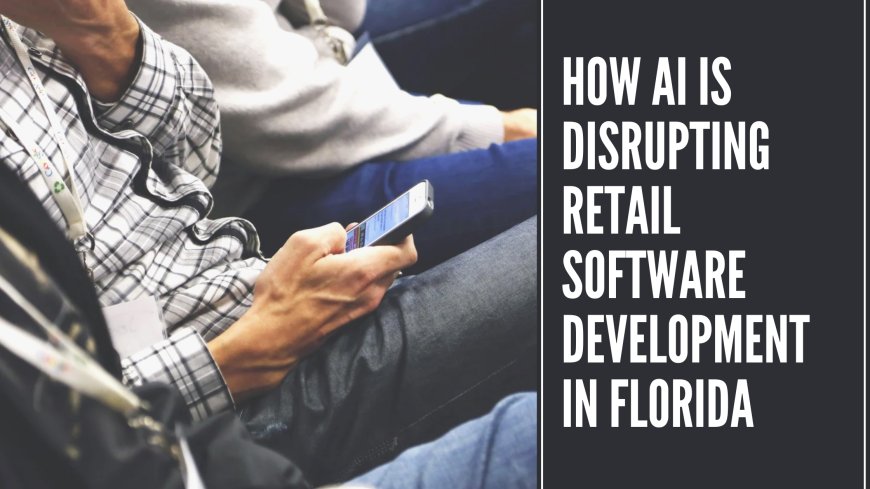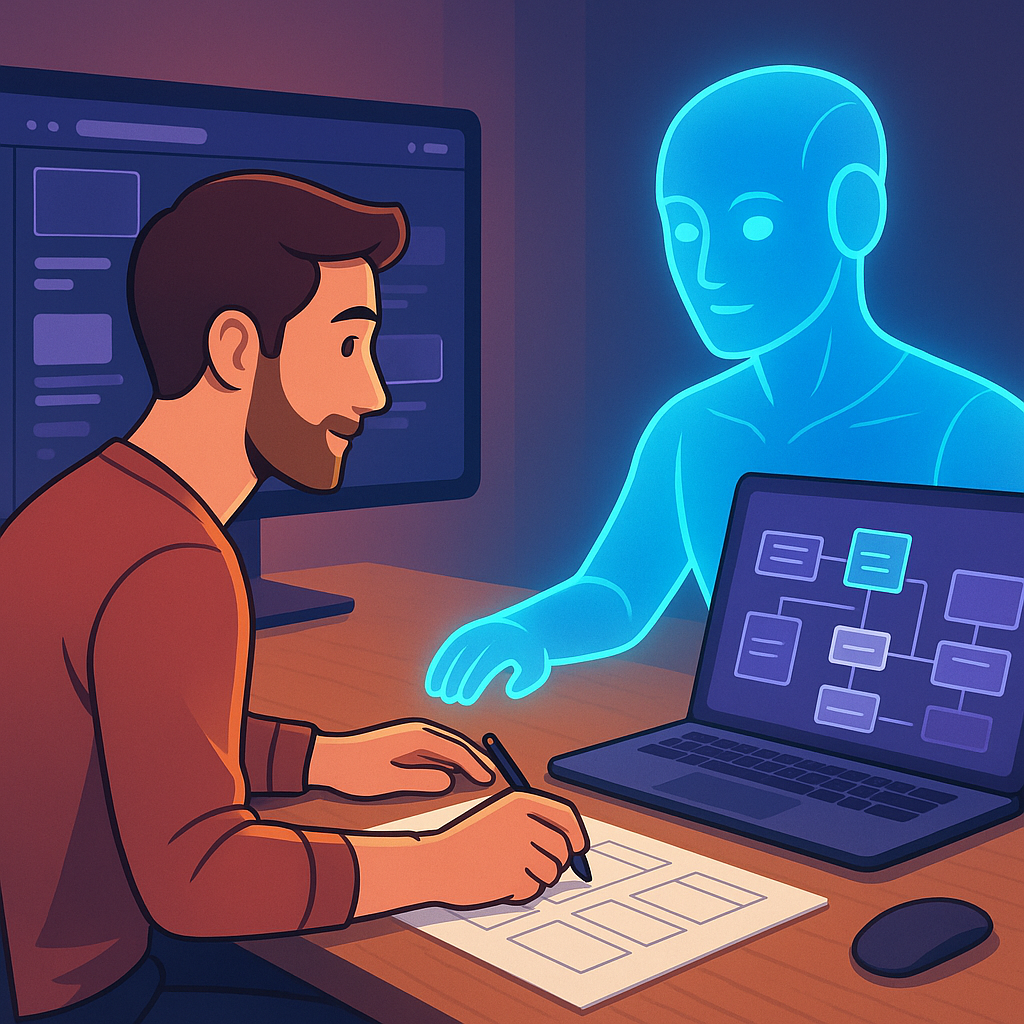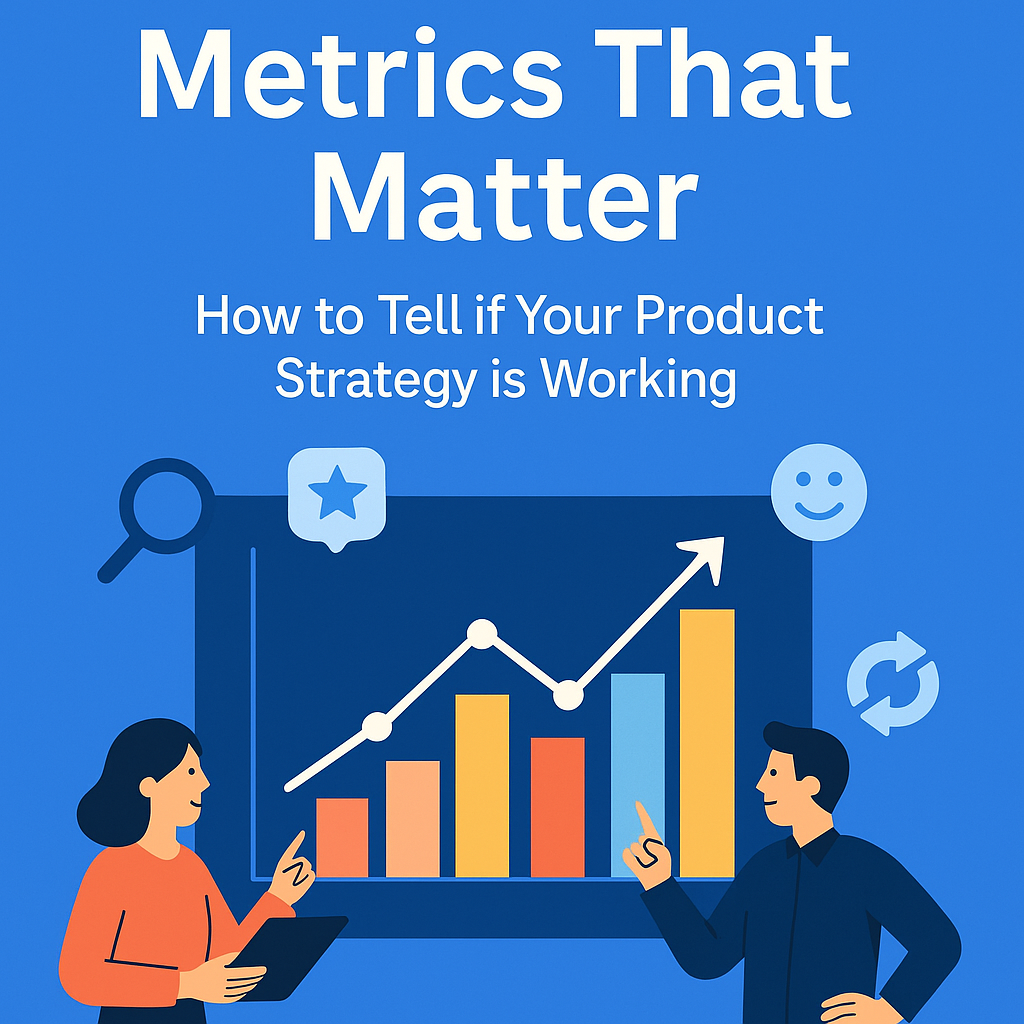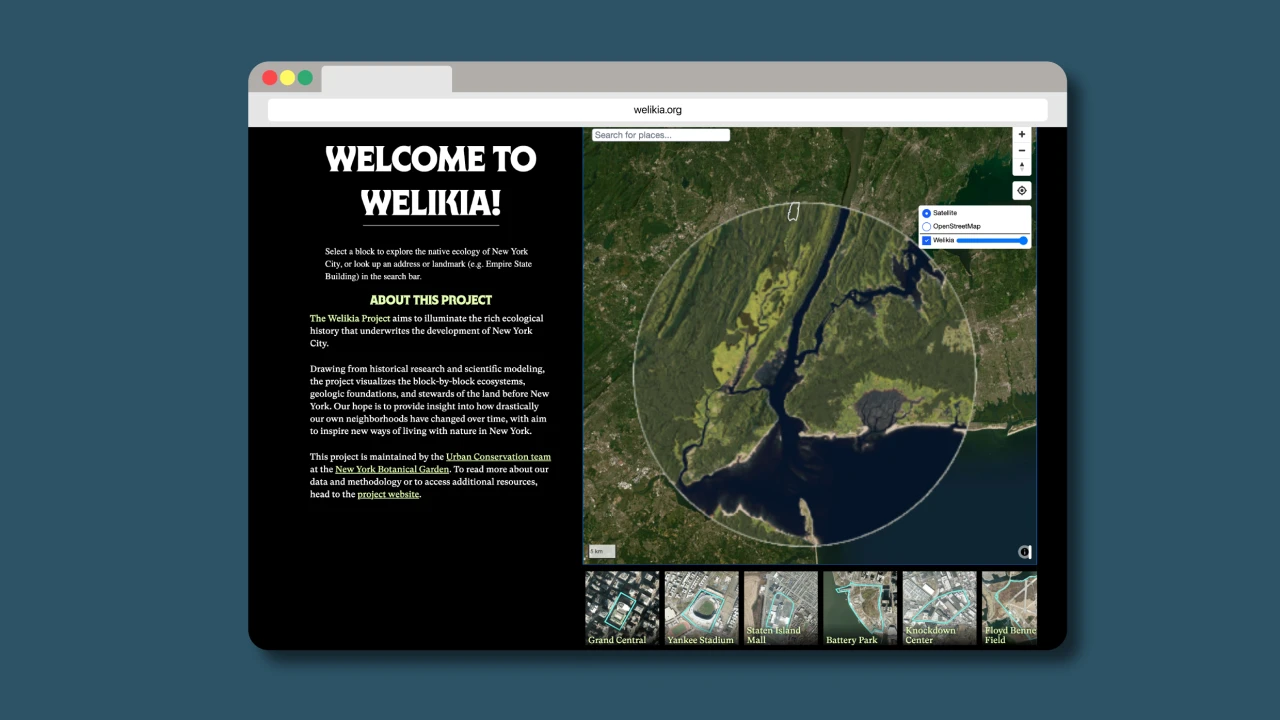How AI Is Disrupting Retail Software Development in Florida
Artificial intelligence has irreversibly changed how retail software is built, deployed, and evolved in Florida. From predictive analytics to intelligent customer service, AI is no longer an add-on—it’s the backbone of modern retail technology.

Retail software used to be predictable. Point-of-sale systems, inventory databases, CRM dashboards—you knew what you were getting, and retailers had come to accept that. Then came artificial intelligence. And the Florida retail scene—one of the fastest-evolving retail markets in the U.S.—hasn’t been the same since.
Artificial intelligence is no longer just a futuristic concept whispered about in boardrooms. It’s working behind the scenes in local boutiques, sprawling supermarkets, online-native startups, and omnichannel retailers. In Florida, a unique melting pot of tourism, consumer diversity, and tech-friendly policies, AI is reshaping how retail software is designed, deployed, and scaled.
This blog is a deep dive into how AI is truly disrupting retail software development in Florida—not just the glossy headlines, but the actual ways it's being built and used. We’ll cover the impact, the tools, the shift in developer mindsets, and the road ahead.
Florida’s Retail Landscape: A Perfect Testing Ground for AI
Florida’s economy thrives on tourism, hospitality, and consumer spending. That translates into high footfall in retail outlets and a strong demand for smooth, personalized customer experiences. With millions of transactions occurring daily across malls, theme parks, cruise lines, and eCommerce platforms, retail in Florida operates on a scale few regions can match.
This massive volume of data makes Florida a fertile ground for AI implementation. Retailers here are constantly looking for an edge—something that can predict customer behavior, optimize supply chains, and drive loyalty. But they don't want off-the-shelf solutions anymore. They want tailored software that thinks on its own, adapts fast, and delivers real-time intelligence.
AI offers exactly that. But it has also forced a rethinking of what retail software even is.
From Rule-Based to Intelligent Systems
Traditional retail software followed a simple formula: rules, conditions, and triggers. If a product sells out, restock it. If a customer buys twice in a week, send them a coupon. Basic automation, no thinking required.
Enter AI.
Modern AI-powered systems don’t wait for a human to define a rule. They learn from historical data, track user behavior, and optimize experiences on the fly. That’s a tectonic shift for developers. Software now needs to integrate with machine learning models, NLP engines, and neural networks—layers that weren’t even in the vocabulary of most retail developers five years ago.
Retailers in Florida aren’t just asking for software; they’re asking for AI models that:
-
Predict stockouts before they happen
-
Personalize discounts based on intent, not just behavior
-
Detect fraud with adaptive algorithms
-
Understand voice commands from multilingual customers in real-time
-
Dynamically update pricing using market data and competitor analysis
These aren’t bells and whistles—they're new baseline expectations.
Custom Retail Software Is Now Built for Uncertainty
In the old world, developers built systems with fixed workflows. AI changes that. Today’s custom software is expected to make decisions based on incomplete or evolving data. That’s hard to plan for. But it’s essential.
Take a Florida-based apparel chain with dozens of locations. They don’t just want software that reports which SKU is underperforming. They want to know why. And they want the system to suggest whether it’s a location issue, a seasonal dip, or a pricing mismatch. This kind of diagnostic capability doesn’t come from dashboards. It comes from models trained on customer footfall, weather data, purchasing patterns, and even social sentiment.
In other words, developers are no longer building software—they’re building intelligent ecosystems that learn and evolve. That changes the architecture. That changes the workflows. That changes the developer’s job entirely.
AI Is Democratizing Personalization at Scale
One of the most compelling impacts of AI in retail software is its ability to personalize experiences at scale. This was once the holy grail—now it’s becoming table stakes.
In Miami or Orlando, where retail caters to tourists from Latin America, Europe, and Asia, language and cultural personalization isn’t a luxury. It’s survival.
AI-driven systems can dynamically switch UI language, adjust product recommendations, or optimize promotional content based on the user’s profile. A customer from Argentina browsing a Florida eCommerce site might see different products, price bundles, and checkout flows than a customer from Quebec. All without human intervention.
Custom retail software built with embedded AI makes this seamless. Developers are integrating multilingual NLP models, AI-based recommendation engines, and hyper-local analytics to ensure every customer feels like the system was built just for them.
The Supply Chain Is Getting Smarter—Fast
Retail software in Florida is not just about the storefront. It’s deeply tied to logistics and fulfillment. And this is another area where AI is shaking the foundations.
AI is being used to optimize routing for delivery trucks, predict warehouse demand, and even negotiate better supplier deals. Custom software is being built with AI components that ingest real-time data from shipping APIs, traffic feeds, and IoT-enabled devices to make logistics smoother and faster.
Retailers in Tampa and Jacksonville are deploying predictive systems that can automatically adjust delivery schedules based on weather forecasts or port delays. These aren’t giant tech conglomerates—they’re mid-size retailers using custom AI-driven solutions built specifically for their operations.
Developers now have to understand not only software and AI, but also transportation models, procurement cycles, and demand variability. Retail software development is no longer a back-office task—it’s business-critical strategy.
The Rise of Predictive and Prescriptive Analytics
In the AI era, analytics in retail software goes far beyond reporting. We’ve moved into two new categories: predictive and prescriptive.
Predictive analytics answers, “What’s likely to happen next?”
Prescriptive analytics answers, “What should we do about it?”
Retailers across Florida are turning to developers to build systems that deliver both.
Imagine a POS system that doesn’t just record transactions but analyzes them to suggest what products should be promoted next week. Or an inventory management system that flags underperforming SKUs and recommends bundling strategies. That’s what’s happening today.
Custom software solutions now include embedded AI models trained on thousands of variables. Developers are incorporating AI toolkits, time-series forecasting libraries, and data visualization layers directly into the software stack.
And it’s paying off. Retailers that once needed an army of analysts can now rely on their software to provide instant insights—and actions.
Human-Centric AI: The UX Revolution
As AI becomes more central to retail software, one paradox becomes clear: human experience matters more than ever.
Florida’s retail scene thrives on hospitality. Whether it’s an outlet in Palm Beach or a surf shop in Key West, customers expect to be treated like VIPs. That means the software must be smart and human-friendly.
Developers are now tasked with making AI invisible. The goal? Don’t let the customer feel like they’re interacting with a machine. Make it seamless, anticipatory, and intuitive.
Voice AI, chatbots with sentiment detection, gesture-based interfaces, and adaptive UI—all powered by AI—are becoming standard features in Florida’s custom retail apps. And developers are designing these not just for function, but for emotional resonance.
UX design is no longer separate from AI. It is AI. And that demands a whole new mindset.
Ethical and Regulatory Considerations Are Becoming Central
AI may be exciting, but it’s not without risks. Privacy, bias, and explainability are serious concerns—especially in customer-facing software.
Retailers in Florida, particularly those handling large volumes of international data, are asking pointed questions:
-
Is our AI system GDPR and CCPA compliant?
-
Are recommendations biased by gender, ethnicity, or geography?
-
Can we explain how a pricing model reached its conclusion?
These concerns are shaping how custom software is developed. Developers are now working closely with legal teams, compliance officers, and ethicists to ensure AI systems are auditable and transparent.
It’s not just about building what’s possible—it’s about building what’s responsible. And in retail, where brand trust is everything, that’s non-negotiable.
Developers Are Learning to Think Like Data Scientists
AI is changing the developer’s toolbox. In Florida’s retail sector, developers aren’t just coding screens and APIs. They’re cleaning data, training models, and tuning algorithms.
The lines between software engineer, data analyst, and AI architect are blurring. Development teams now include roles like:
-
ML Engineer
-
Data Annotator
-
AI Product Manager
-
Retail Domain Expert
That’s because AI-first retail software can’t be built in silos. It requires cross-functional collaboration and deep vertical knowledge.
For software development firms and tech teams in Florida, this shift is both a challenge and an opportunity. Those who embrace it are quickly becoming leaders in the retail AI space.
The Tools Behind the Transformation
What’s enabling this AI-powered disruption in Florida’s retail software?
Some of the most popular and impactful tools include:
-
TensorFlow and PyTorch for custom ML models
-
Google Cloud AI and Azure ML Studio for scalable training and deployment
-
OpenAI’s APIs for advanced NLP and chatbot functionality
-
Snowflake and BigQuery for real-time data analysis
-
Power BI and Tableau with AI features for decision intelligence
Retail software developers in Florida are blending these with legacy ERP systems, mobile frontends, and eCommerce platforms to create cohesive, AI-augmented ecosystems.
What the Future Looks Like
AI’s role in Florida’s retail software development is only growing. What started with personalization and analytics is moving into generative AI for ad creation, autonomous checkout systems, and even AI-generated product design.
Custom software will soon include:
-
Virtual shopping assistants
-
AR-enabled fitting rooms driven by computer vision
-
AI-led trend forecasting tools for inventory planning
-
Real-time negotiation bots for B2B retail contracts
And while some of this may seem far off, development is already underway. Florida’s retail ecosystem is a microcosm of what’s to come globally—a proving ground where AI in retail software is not just theoretical, but operational.
Conclusion
Artificial intelligence has irreversibly changed how retail software is built, deployed, and evolved in Florida. From predictive analytics to intelligent customer service, AI is no longer an add-on—it’s the backbone of modern retail technology.
Retailers today are not just looking for applications; they’re looking for intelligent systems that help them navigate an increasingly complex, data-driven world. And the custom software development community in Florida is rising to the challenge, building AI-first solutions that don’t just meet expectations—but reshape them.
For any business aiming to keep up in this AI-transformed retail reality, partnering with a software development company in Florida is no longer optional—it’s essential.





































































![https //g.co/recover for help [1-866-719-1006]](https://newsquo.com/uploads/images/202506/image_430x256_684949454da3e.jpg)



























![How Smart PMs Scale Their Careers in Any Org [TPG Live Recap]](https://tpgblog.com/wp-content/uploads/2025/06/2025-06-12-thumbnail-action.png?#)














































![She Started a Creative Side Hustle While Working 'Dead-End' Jobs — Then Grew It From $10,000 to Over $50,000 a Month: '[It] Became Magnetic'](https://assets.entrepreneur.com/content/3x2/2000/1747759671-music-lessons-boston.jpg?#)






